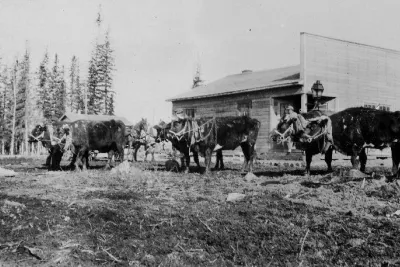William's Journey
Excerpts from a Transcript of a Tape Recorded Interview with Mr. William Howes, Carragana, SK
Conducted by D.H. Bocking, June 12, 1963. S-C19
D.H. Bocking:
Why did you decide to come to [Canada]?
William Howes:
From England?
DB:
Yes
WH:
I was apprenticed to electrical work. I served my apprenticeship. I liked my work and I wanted to get out and get more experience when my apprenticeship was finished and I answered an ad from a firm in Woolich. The Boer War was on at that time and things were more or less booming there. And I took this job and I seemed to get along very satisfactorily. I was always a student of theory and they were up against some problems and actually were being sued by the burrough because they couldn’t complete their contracts. And I was able, with my little bit of theory, to do the thing for them and saved them a little bit of money, and they raised my wages.
DB:
What would you have been getting there?
WH:
I shouldn’t tell you that. I wanted a journeyman’s wages. Improver’s wages were standard at about seven pence an hour; that’s 15 cents an hour. But he balked at that when he hired me and said, “I’ll give you that if I find you’re worth it. But I’d like to start you at four pence an hour.” This is the same as when apprentices get their first job. I said, “No.” He said, “Well, I’ll make it five pence. Did you ever have any experience in a certain line of telephone communication work?” I said, “Yes. I just came off that.” He said, “Well, we’re up against a problem. We’re being sued. If you can unravel this problem we have I’ll have no trouble raising your wages. But you can only work there at nights and Saturdays.” Well, it was easy for me. He gave me an apprentice to work with me and I got along good on the job.
But then the war ended. 50,000 men were discharged from Woolich Arsenal in one week. Everything went flat in that country. Nobody hired any extensions in electrical work. Building all stopped and it seemed it was going to spread all over that part of England. There was maybe 10 men working there when I was hired. I saw them all go and I was the last, then my turn came. I got another job and I went to Kensington. The traveller, he lost his job and he took me to Kensington. We got a job there and the same thing happened there. There would be maybe 15 men working on that firm doing wiring work. But bit by bit it slowed down until there was only two or three of us; my turn came. Now I was out of work and I felt it terribly.
I was 7 weeks out of work. I couldn’t get a job anywhere. I didn’t complain to my father, but I saw my savings were going, my boots were wearing out and I just had enough to buy my ticket to Canada, which was booming at that time.
DB:
How much did your ticket cost?
WH:
I think it was $50.00
DB:
That would take you how far?
WH:
To Winnipeg
DB:
Did you pack up many goods to take with you?
WH:
No, I didn’t have very much. I had brought my clothes. I left the few little things that I had gathered up with my folks. Their home was in Monmouth, the capital town of the county. They looked after that. I told them I would be back pretty soon. But I didn’t get back.
DB:
Do you remember the name of the boat you crossed on?
WH:
Yes, it was the Corinthia.
DB:
Were there lots of passengers? Was it crowded?
WH:
There were three parts to the passengers. I was Second Class. Three parts of those were electricians. It seems that electricians got hit more than anybody else, with this unemployment.
DB:
Your meals were provided? You didn’t have to bring any food?
WH:
Yes. We had a nice time.
Note: William Howes worked at a number of jobs in Manitoba and Saskatchewan before he took up entry on a homestead near Swarthmore before doing military service during the Great War. After the war, he settled and farmed near Prairie River/Carragana, part of the Porcupine Soldier Settlement.

Soldier settlers with their oxen and supplies set out from Prairie River, SK, for the Carragana district, ca. 1929. PAS Photo S-B12709.